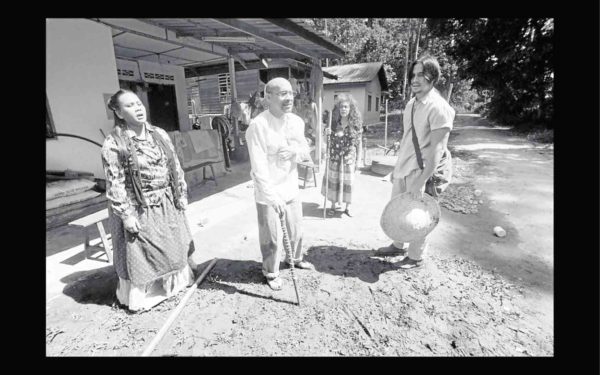Lav’s martial law musical: Never again!
Apart from popular stars like Piolo Pascual and Shaina Magdayao, Lav Diaz tapped theater thespians like Bituin Escalante, Bart Guingona and Pinky Amador for his latest endeavor, the martial law musical “Ang Panahon ng Halimaw” (Season of the Devil)—an entry in the main tilt of the Berlinale, ongoing until Feb. 25.
Known primarily as a singer, Escalante is also considered a seasoned theater actress, having lent her powerful pipes to the local productions of “Rent” and “Dreamgirls.” Still, she is actually a first-timer on the set of a Diaz film.
The newbie, however, didn’t have much difficulty shifting from stage to screen. “Lav is so relaxed and very collaborative … almost improvisational. Masarap katrabaho (A pleasure to work with),” recalled Escalante who portrays “Kwentista,” the storyteller and conscience of the lead character (Pascual).
She admitted that “there is a sense of pride in having our premiere in such a prestigious festival. Given our ‘colonial mentality,’ it might do the film well to be recognized abroad.”
But she feels strongly about having screenings in the Philippines, too. “Gusto ko talagang makapanood nito ay ang mga kababayan ko. (I want my countrymen to see it.)”
Article continues after this advertisementShe explained: “It’s important to tell this story because we have to counter all the historical revisionism happening in our country now. This happened, and we must never let it happen again.”
Article continues after this advertisementEscalante flew to Berlin, where she stayed for only three days. “I had to fly
back to Manila, for the play ‘Himala, Isang Musikal.’”
Early reviews are tentatively mixed, but Escalante was singled out by The Hollywood Reporter’s Clarence Tsui as “wonderfully voiced.” Meanwhile, Screen International’s Jonathan Romney pointed out that not all the cast members are “natural singers,” a function of the film’s “Brechtian/distantiation strategy,” but Escalante “brings the soundtrack to
life with her authoritative
interventions.”
Unlike Escalante, Guingona is a Diaz regular, having collaborated with the Venice-winning filmmaker half a dozen times “including in some yet-to-be-released titles.”
Guingona described Diaz as “an actor’s dream director.”
He clarified: “Working with him requires mutual trust … That makes it gratifying, because you level up to each other’s standards. It’s a professional way of practicing the craft.”
Guingona, who plays Paham the village wise man in the film, was one of the first members of the team to arrive in Berlin, along with Diaz and producers Bianca Balbuena and Bradley Liew and coactor Hazel Orencio.
He owned up: “I am excited, well, nervous really for our screenings. We sing our dialogue (a cappella in the movie), which brings out more of our emotions.”
He asserted: “The story is an allegory for our times. It’s brave, unflinching and as dark as the times we live in today. I hope people get that.”
The last time Amador worked with Diaz was in the 2002 film “Hesus, Rebolusyonaryo.” “But Lav’s form and style have changed since then.”
Amador, who was an original cast member of West End’s “Miss Saigon” in the 1990s, admitted that the experience was initially “nerve-wracking.”
Although she was in the middle of rehearsing a play in Manila, she opted to stay in Malaysia, where the film was shot, all throughout the 18-day filming. “My scenes, including the solo, were the first to be filmed.” It felt like a huge responsibility to start the ball rolling, she recalled.
Amador, who plays Kwago (a widow ostracized as an aswang by the militia), detected a “pasyon”-like quality in the film’s music.
In a lot of ways, the film retraces the nation’s calvary during the bleak days of martial rule. It’s imperative to tell this story, she insisted, “because the world is full of hate and confusion, we need a beam of light.”
In any case, she pointed out, the atrocities depicted in the film happened, and are still happening, not only in the Philippines, but all over the world. “It’s universal. It’s something we cannot hide.”
